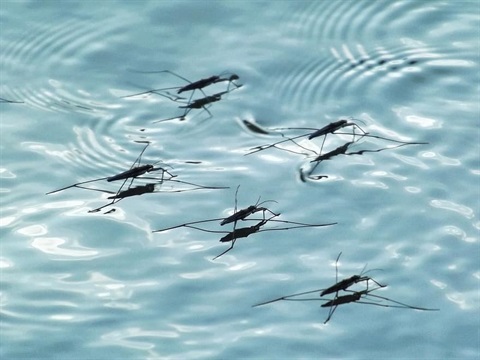Weed and Pest provides mosquito prevention tips, spraying info
Published on July 09, 2024

The City of Cheyenne Weed and Pest Division has detected a significant increase in mosquito activity in portions of the city and county over the last week. Elevated temperatures will likely contribute to increasing numbers of mosquitoes in the coming weeks. Weed and Pest will continually inspect known larval mosquito habitats and will also begin Ultra Low Volume (ULV) truck spraying for adult mosquitoes in areas with elevated mosquito numbers. These trucks will pass through neighborhoods and recreation areas after sunset. Residents may see a strobe light and hear a small equipment motor as they pass.
Most mosquitoes do not test positive for disease-causing viruses. However, a bite from a West Nile Virus-infected mosquito can cause serious illness, and in some cases, death. Although a person's chances of getting sick are small, those aged 50 and older are at the highest risk for serious illness. Not everyone infected with West Nile Virus will become ill. However, West Nile Virus can cause serious complications, including neurological diseases, and can also cause a milder flu-like illness, including fever, headaches, body aches, nausea, skin rash, or swollen lymph glands. If you think you have symptoms of West Nile Virus, see your doctor right away.
Mosquitoes can reproduce in any water that is left standing for more than 7 days. Many types of mosquitoes – including those that can spread disease – lay their eggs in items around the home, such as in birdbaths, unused flowerpots, discarded tires, small ponds, or other bodies of stagnant water.
The Weed and Pest Division asks that residents do their part to eliminate any standing water where mosquitoes could breed. The most effective mosquito control begins in your yard.
- Drain or remove any items that can hold water on your property, such as toys, buckets, wading pools, canoes, and wheelbarrows.
- Drill holes in the bottoms of containers and remove any discarded tires.
- Tightly cover water storage containers such as buckets, cisterns, and rain barrels.
- Repair cracks or gaps in septic tanks and cover open vent or plumbing pipes with mesh that is smaller than a mosquito.
- Make sure that roof gutters drain properly, clear vegetation and debris from the edges of ponds, and remove leaf debris from yards and gardens.
To reduce your risk of mosquito bites, remember the 5 D’s:
- DUSK & DAWN-Stay indoors when mosquitoes are more active.
- DRESS - Cover-up as completely as possible. Wear shoes and socks, long pants, and a long-sleeved shirt when outdoors for long periods or when mosquitoes are more active.
- DRAIN - Reduce the amount of standing water in or near your property by draining and/or removing it.
- DEET- Use mosquito repellent, which should always be applied according to label directions.
To learn more about West Nile Virus, visit the Wyoming Department of Health online at https://health.wyo.gov/publichealth/infectious-disease-epidemiology-unit/disease/west-nile-virus.
More information on ULV truck spraying can be found at https://www.cdc.gov/mosquitoes/mosquito-control/truck-spraying.html.
Times and locations of spraying are available at www.cheyennecity.org/weedandpest.
All applications are on a weather permitting basis and may need to be rescheduled.
For questions, call Weed and Pest at (307)-637-6475 or email weedandpest@cheyennecity.org.